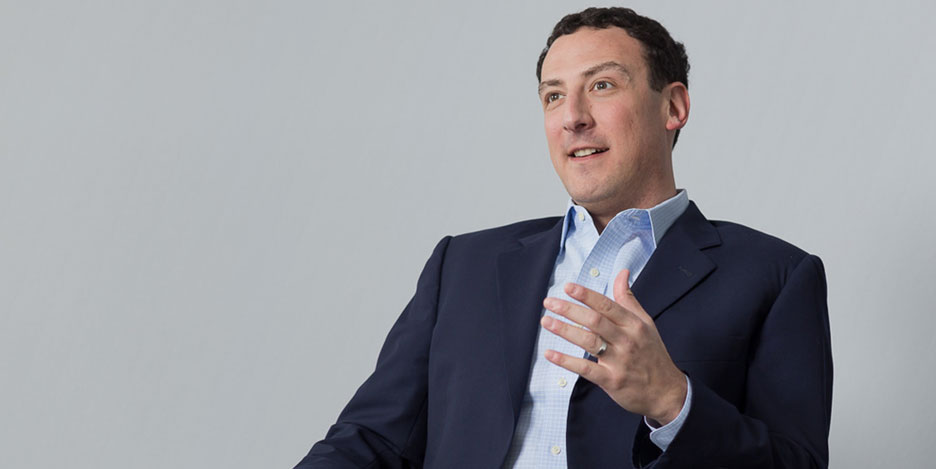This week’s guest on Famous Failures is Isaac Lidsky.
Isaac Lidsky is an entrepreneur, bestselling author, and coveted speaker. But that brief description doesn’t do justice to his remarkable resume.
Lidsky was a child television star, appearing as series regular “Weasel” on NBC’s “Saved By The Bell: The New Class.” Lidsky left his acting career and went on to graduate from Harvard at 19 with an honors degree in mathematics and computer science. He returned to Harvard to study law and became the only blind person to clerk on the U.S. Supreme Court (for Justices Sandra Day O’Connor and Ruth Bader Ginsburg). He later took charge of a struggling construction company and grew it tenfold.
Lidsky was born with Retinitis Pigmentosa, a rare degenerative disease of the retina. From age 12 to 25, he slowly lost his sight. Using insights from his experiences, he authored the New York Times bestseller, Eyes Wide Open: Overcoming Obstacles and Recognizing Opportunities in a World That Can’t See Clearly. He founded a nonprofit organization to fund the development of treatments for blinding diseases and within five years grew it to a dozen cities nationwide.
What follows is an edited version of our conversation. I hope you enjoy it as much as I did.
What have been some of the most valuable failures you’ve had in your life and what makes them valuable?
I’m reluctant to talk about them as failures, because I think failures and successes are really one and the same—opposite sides of the same coin. People far smarter than me have talked about how failure is fertile soil for progress and growth. It’s largely cliché, but I think it’s cliché for a good reason. Many of the “successes” you would point to included plenty of failures along the way, or mistakes, or accidents, or setbacks.
The construction business that I currently own with two partners, which I serve as chief executive officer, is an incredibly successful, thriving, growing business. It’s blessed with a great team of people, a compelling vision, and a reputation of excellence in our industry.
The business began when my college roommate and I acquired the assets of a small, humble, residential construction company in Orlando. We meticulously analyzed the data and pored over spreadsheets. We went into the deal with the best intentions, and we certainly did our best based on what we knew at the time.
But looking back, we had no idea what we were doing. It was all but certain to be a disastrous mistake. We bought a company that wasn’t treading water like we thought, but was sinking like a stone. It was hemorrhaging money. We clearly didn’t do a very good job in our due diligence process.
That was a really tough moment in my life. About three months in, suddenly [my wife] Dorothy and I were talking about going through bankruptcy and moving in with her parents with our one-year-old triplets. It was a really dark time.
We were able to pull the team together and turn it around, and take some emergency measures. It’s tempting to look back at this experience, adopt a revisionist history, and say, “Wow, we were really ahead of the curve with this buy. We had a great vision, and we did a great job.”
I refuse to do that. Buying the business was a huge mistake, certainly given the price we paid for it. But having bought the business, we had to do what we had to do to turn it around.
Three months in, you were almost going through bankruptcy. How did you find the motivation to persist? Instead of quitting, what made you decide to forge ahead?
That’s something that I cover in detail in my book, particularly in chapter three. When I think about our fear of failure and ongoing struggle in the face of big challenges, I think about Teddy Roosevelt’s brilliant remarks about the critic and the strong man. To my mind, Roosevelt’s critic embodies our fear of failure, a very pernicious force, this nasty voice in our mind that tells us what we can’t do. It tells us what other people are going to think and say about us, and it can be really debilitating.
On the other hand, I’m convinced to my core that we are all born strong men and women. So when you read Roosevelt’s remarks about the attributes of a strong man, I think that’s who we are at our core. I think that is the profound truth that underlies the Nietzsche quote, “What doesn’t kill you makes you stronger.” Our very existence is a series of moments of opportunity. The challenge is to silence that nasty critic in your mind—or at least, do your best to ignore it—and at the same time you harness your strength within, listen to that strong man inside you, and believe him.
I fought very hard to do that. As the business was collapsing around us, I was having panic attacks and quite frankly wanted desperately to throw in the towel. But I had a zealous commitment to accountability in my thoughts and my actions and a logical assessment of the situation. The opportunity we had gotten so excited about was as compelling as ever. The problem was that we had bought the wrong business, and certainly paid too much for it. So what? We decided to give it a go. It took a lot longer than we had hoped, and it was far more work than we had hoped, but eventually we were able to turn the business around.
The idea of the critic and the strong man goes well with another concept that you talk about in your book, which is the idea of the backward swimming fish. I’d love to hear a little bit more about that and how fear of failure can be a backward-swimming fish, and how that fits into the paradigm that you set up in the book.
With sincerity and no drama, I’ll say that going blind really was one of the best things that ever happened to me. I mean it in a very specific way. As my sight progressively deteriorated, producing all these bizarre visual effects, I literally got to see firsthand the awesome power of the human mind to create a reality that we perceive as objective truth, as something that’s out there beyond us.
But it’s nothing like that. It’s the imagination of the mind. This idea extends far beyond sight and into all aspects of our lives. This is the profound insight that I gained as I lost my sight. And it’s been incredibly rewarding for me.
The circumstances that we confront in our lives do not dictate the reality we experience. How those circumstances manifest themselves in our lives, in our realities, is entirely within our control. It certainly doesn’t always feel that way, and it’s very hard to do, but it’s important. [Controlling our realities] is a noble pursuit and it engenders a lot of great rewards. If you listen to the critic in your mind long enough and if you’re not careful, you will believe him. Then the criticism becomes self-fulfilling. Once you believe him, it brings about the result you hoped to avoid in the first instance.
Think about someone who’s a dancer, let’s say, who loves their craft and finds joy in it, but is so terrified of the nasty reviews of both that internal critic and external critics, that it keeps them off the stage. They lose the joy in dancing and stop doing it altogether. To me, that’s the allegorical heart-breaking example of this dynamic at work.
Taking control of your reality is understanding that these nasty messages you’re getting from yourself, and this barrage of cues you’re getting from what you see around you about what success should look like and what you should be doing, are really just noise. They don’t need to govern your life, your behavior, or your decisions, unless you choose to let them do so.
I think fundamentally it is all choice. We choose in every single moment how we want to live our lives and who we want to be.
Yet that choice is so difficult to make when you’re going through a catastrophic failure. Do you have any particular strategies that you use for viewing the inner critic more objectively and seeing the critic for what it is, which is, as you put it, just noise.
The critic really overwhelms us with scale. The critic presents this lofty, idealized view, soaring high above it all. It’s a view in which the paths of progress are too small to see. The rate of progress appears painfully slow. You can take in the towering magnitude of your greatest aspirations, and it’s overwhelming. For me, that’s how the critic wins, with this lofty, idealizing perspective. What I try to do to quiet that critic is to focus on two pretty simple questions.
The first question is, what is it that I want to accomplish? Only you can define your success. When we let our critic do it for us, or anyone else for that matter, we cannot succeed, by definition. It’s very easy to become confused by what it is we’re even trying to do. What is important to you? How do you want to spend your time? What kind of an employee do you want to be? What kind of a parent do you want to be? What matters to you? What is your stake in this?
The second simple question is, what is my best immediate next step? It’s obviously important to think long term and about strategy, but it’s far too easy for us to get lost in that scale. You will never get from A to Z if you don’t get from A to B. And the world is going to change a million times on your way from A to Z.
Momentum is an overlooked asset in life. Figure out the best next step and take it.
I like that a lot, especially the importance of momentum. Progress is the best motivator, as you said. If you put one foot after the other, before you know it, the distance behind you is longer than the distance ahead of you.
Absolutely. It’s shifting your focus on what’s important. The critic insists upon perfection, and lives in a world of comparison, of relative merit. The strong man values only effort, growth, and progress.
If you look at life that way, it starts to get a lot more fun.
Aside from the near failure with the construction company, are there any other failures that stand out to you?
There’s a series of failures on the way to every success. I clerked for Justices O’Connor and Ginsburg. I had long been fascinated by the Supreme Court, and I applied four years in a row. I was rejected four times by all of the justices, except for one justice who accepted me the fourth time.
I used to joke that I was going to keep applying until I was older than the youngest justice. Again, you could say, “Oh, well, those weren’t failures because it ultimately worked out.” But I’ll tell you, year three was tough and year four was even tougher. Again, I relied on those two simple questions: What am I trying to accomplish and what’s my best next step?
You’ve made some pretty significant career pivots at different points in your life. You started out as an actor, and then you went into Math and Computer Science. You founded a tech company with one of your roommates, and then you pivoted into law and from law into entrepreneurship. What’s the driving force? What’s motivating you to make these pivots in your life?
Living and leading with eyes wide open really begins with zealous introspection as to who you want to be, how you want to live your life, how you want to spend your time, what you want to be doing, and what’s important to you. Those things naturally change and evolve as we go through life. They change as we learn more about ourselves and about the various pursuits that we were once inclined to undertake. I understand that one can look at my “career path,” and it seems very slap-dash.
As matters evolved for me, it was never about trying to fit pieces together linearly; it was more of a commitment to being honest and open with myself.
I always knew I wanted to go to law school. My father is a lawyer, and I loved the idea of studying law as a way of learning a new mode of thinking. Math is very similar. It’s a different approach, to be sure, but it’s also an analytical framework for how you view the world.
The Internet start up was an opportunity that presented itself, so I did that for a couple of years. When that became a “real job,” so to speak, when we hired our own bosses, and it became more of a nine to five, I was no longer excited about it. So I left.
I had a great time in law school, and I had a phenomenal four or five year run in the public sector between the Department of Justice and the Supreme Court, and absolutely loved it. I took the obvious next step of working for a huge international law firm. While there are people who enjoy it, and find it rewarding—and that’s great for them—I wasn’t one of those people. I was miserable. I had to do something about it, and so I did. That is what led to my current business pursuit.
As for my book, I feel so enormously blessed and lucky that I’ve had these insights of blindness. They’ve been so positive in my life, and I’ve long wanted to share them with others. A couple of years ago, my construction business had gotten to a point where our chief operating officer had earned the right and the opportunity to run it day in and day out. I stepped back from the day to day running of the business, at a time when a lot of folks thought that was an odd moment to make this choice. Bigger, better, and faster seemed to be the obvious choice. But I spent a good deal of time writing this book exactly the way I wanted to write it, and that was huge.
The book has led to, particularly after my TED talk, doing a lot of speaking. I spend most of my time traveling to give keynote addresses to corporations and organizations. I’m in the midst of what you could call another career. It’s more of a passion project, a labor of love for me, but it is at the same time a whole new business that I’m in.
Do you have any parting thoughts on failure that you’d like to share?
Failure is perspective. Much like we grossly misperceive the force of luck in our lives, and misperceive all sorts of machinations of our mind, we also misperceive failure. In two very similar people, who are in exactly the same circumstances, the exact same event can produce completely different results. It can be the beginning of a demise for one, and a flourishing for the other.
What’s the difference?
The difference is choice and perspective.
Bold



